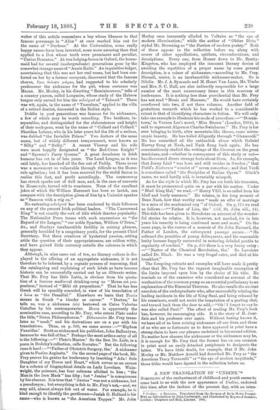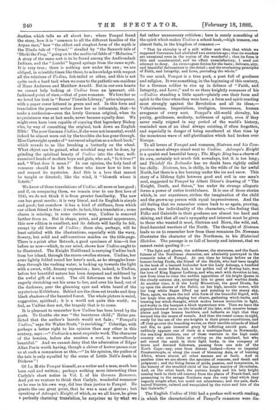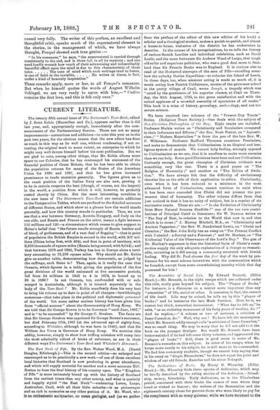A NEW TRANSLATION OF " UNDINE."* SOMETHING of the enchantment
of childhood and youth seems to come back to us with the new appearance of Undine, endowed this time, after the fashion of the present day, with an intro- Undine : a Romance. Translated from the German of De la Hotta Fonque. With an Introduction by Julia Cartwright, and Illustrated by Heywood Sumner, London : Chapman and Hall, Limited. 1888. duction which tells us all about her ; where Fouque found the story, how it is " common to all the different families of the Aryan race," how "the oldest and simplest form of the myth is the Hindu tale of 4Urvasi,' " rivalled by " the Sanscrit tale of `Bheki the Frog,' "going on to the medimval fable of "Melusina." A story of the same sort is to be found among the Andirondack Indians, and the " Lorelei " legend springs from the same myth. It is very true ; there is nothing new under the sun ; we are obliged, in scientific times like these, to acknowledge with respect all the relations of Undine, fish-tailed or other, and this is not quite such a hard task when we come to the pathetic sea-maidens of Hans Andersen and Matthew Arnold. But in our own hearts we cannot help looking at Undine from an ignorant, old- fashioned point of view,—that of pure romance. We love her as we loved her first in " Barns' Fireside Library," price ninepence, with a paper cover lettered in green and red. In this form and translation the present writer knew her so intimately, that—to make a confession—even the lovely German original, when its acquaintance was at last made, never became equally dear. We might even have been capable of copying that legendary Bishop who, by way of consulting the original, took down an English Bible ! The poor German Undine, if she were not immortal, would indeed be almost worn out by the troubles she has gone through. Miss Cartwright speaks of " universal adoption as a school-book," which sounds to us like breaking a butterfly on the wheel. What object can be gained, what mischief may not be done, by grinding the spiritual beauty of Undine into the clear, well- examined heads of modern boys and girls, who ask," Is it true P" and, " What does it mean P" In our opinion, the holy land of romance should be left to those who know how to love it and respect its mysteries. And this is a love that cannot be taught or directed ; like the wind, it " bloweth where it listeth."
We know of three translations of Undine, all more or less good ; and if, on comparing them, we remain true to our first love of 1845, we do not think it is from greater familiarity. The new one has great merits ; it is very literal, and its English is simple and good ; but somehow it has a kind of stiffness, from which our oldest friend is free : it reads, in fact, like a translation ; some charm is missing; in some curious way, Undine is removed farther from us. But in shape, print, and general appearance, this new edition is excellent, and its defects will hardly be felt, except by old lovers of Undine; these also, perhaps, will be least satisfied with the illustrations, especially with the wavy, flowery, but solid and self-conscious maiden on the title-page. There is a print after Retzsch, a good specimen of him—it lies before us now—which, to our mind, shows how Undine ought to be illustrated. The Knight Haldbrand is carrying Undine back from her island, through the storm-swollen stream. Undine, her arms lightly folded round her lover's neck, as he struggles knee- deep through the rushing water, is looking up towards the light with a sweet, wild, dreamy expression ; here, indeed, is Undine, before her beautiful nature has been deepened and saddened by the awful gift of a soul. The old fisherman on the bank is eagerly stretching out his arms to her, and over his head, out of the darkness, peer the gleaming eyes and white beard of the mysterious Kiihleborn. Behind are the close-set trunks and deep black shadows of the haunted forest. The whole picture is weird, suggestive, spiritual ; it is a world not quite this world ; we feel, as Undine does not, the tragedy that is to come.
It is pleasant to remember how Undine has been loved by the poets. To Goethe she was "the beauteous child ;" Heine pre- dicted that the author's laurels would not fade ; " Fonque's Undine," says Sir Walter Scott, " is ravishing." Coleridge, with perhaps a better right to his opinion than any other in this century, says :—" Undine is a most exquisite work. The character of the heroine, before she receives a soul, is marvellously beautiful." And we cannot deny that the admiration of Edgar Allan Poe is worth having, though a shiver of horror passes over us at such a comparison as this,—" In his opinion, the pathos of the tale is only equalled by the scene of Little Nell's death in Dickens " !
Of La Matte Fouque himself, as a writer and a man, much has been said and written ; perhaps nothing more interesting than Carlyle's short notice in Vol. I. of his German Romance.
And yet we venture to think that Carlyle, wonderful romancer as he was in his own way, did less than justice to Fouque. He
grants the one great point, that he was a man of genius ; but speaking of Aslauga's Knight, of which, as we all know, he gives a perfectly charming translation, he surprises us by what we
feel rather unnecessary criticism ; here is surely something of the spirit which makes Undine a school-book,—high treason, one almost feels, in the kingdom of romance :—
" That its chivalry is of a still wilder sort than that which we supposed Cervantes had abolished two centuries ago ; that its wonders are unnatural even in the region of the wonderful ; that its form is thin and unsubstantial, and its effect unsatisfactory, I need not attempt to deny. An extravagant fiction for the basis; delicate, airy, and beautiful delineations in the detail ; and the everlasting principles of Faith, and Integrity, and Love, pervading the whole."
To our mind, Fouque is a true poet, a poet full of goodness and religion. It was something, in the beginning of this century, for a German soldier to rise up in defence of " Faith, and Integrity, and Love ;" and to us these knightly romances of his —Undine standing a little apart—plainly owe their form and spirit to the time when they were born ; a form and spirit reacting most strongly against the Revolution and all its ideas,— Voltairianism, Imperialism, irreligion, irreverence, human arrogance of every sort. Fouque's old-world chivalry, his purity, gentleness, modesty, nobleness of spirit, even if they never really reigned in any period of the world's history, reminded men of an ideal always existing, if often forgotten, and especially in danger of being smothered at that time by the monstrous wave of self-glorification which had broken over Europe.
To all lovers of Fouque and romance, Sintram and his Com- panions must always stand next to Undine. Aslauga's Knight is a quaint and beautiful fancy ; The Magic Ring has a charm of its own, certainly not much felt nowadays, but it is too long ; and Thiodolf the Icelander has no doubt been rightly called too chilly. Sintram, too, is chilly, in the wilds of its far awful North, but there is a fire burning under the ice and snow. This story of a lifelong fight between good and evil in one man's soul, suggested to Fouque by Albert Diirer's drawing of "The Knight, Death, and Satan," has under its strange allegoric forms a power of entire truthfulness. It is one of those stories which, in our experience, strikes the imagination of the child and the grown-up person with equal impressiveness. And the old feeling that we remember comes back to us again, proving, perhaps, the individuality of the characters,—the feeling that Folko and Gabrielle in their goodness are almost too hard and shining, and that all one's sympathy and interest must be given to those who wanted it most, Sintram and Biorn, the wild, sad, fiend-haunted warriors of the North. The thought of Sintram leads us on to remember how from these romances Dr. Newman illustrates the character of the Northmen, in his Historical Sketches. The passage is so full of beauty and interest, that we cannot resist quoting it :—
" The light and gloom, the nobleness, the sternness, and the fend- fulness of the Northman character, are admirably portrayed in the romantic tales of Fouque. At one time he brings before us the honour-loving Froda, the friend of the Skalds, who had been taught in the book of a learned Icelander how the Lady Aslauga, a hundred years and more before, had, in her golden veil of flowing hair, won the love of King Ragnar Lodbrog, and who, omit with devotion to her, saw from time to time the sudden apparition of his bright Queen in the cloudy autumn sky, animating him to great and warlike deeds. At another time, it is the Lady Minnetrost, the good Drnda, far up upon the shores of the Baltic, on her high, moonlit tower, with her long white finger lifted up and pointing to the starry sky. Then, again, we have the tall slim form of the beautiful Sigrid, with her large bine eyes, singing her charm, gathering witch-herbs, and brewing her witch-draught, which makes heroes invincible in fight, and works in the banquet a black mysterious woe. Then we have the gigantic forms of men on the islands of the lake, with massive breast- plates and huge brazen bucklers, and halberts so high that they seemed like the masts of vessels. And then the vessel comes insight, ready for the use of the sea-knights in their pirate expeditions, and off they go over the bounding waves, on their terrible errands of blood and fire, to gain immortal glory by inflicting untold pain. And suddenly appears one of them at a marriage-feast in Normandy, the sea-king Arinbiorn, one of those warriors in the high coast country who own little or nothing on the mainland, but who sail round the earth in their light barks, in the company of brave and devoted followers, passing from one side of the North Cape—nay, even from distant Iceland—down to imperial Constantinople, or along the coast of blooming Asia, or of burning Africa, where almost all other seamen are at fault. And at another time we are shown the spectres of remorse, and death and judgment ; and the living forms of pride, passion, and temptation, in the history of the troubled child of the fierce warrior of Drontheim. And, on the other hand, the pattern knight and his lady bright coming back to their old country from the plains of Frank-land, and presenting to the savage Northern race the very ideal which they vaguely sought after, but could not adumbrate ; and the pale, dark- haired Sintram, calmed and vanquished by the voice and late of the fair Gabrielle."
The English Undine of 1845 had a preface well worth reading, in which the characteristics of Fonqu4's romances were dis-
cussed very folly. The writer of this preface, an excellent and thoughtful critic, speaks much of the supernatural element in the stories, in the management of which, we have always thought, Fouque showed such true genius :—
" In his romances," he says, "the supernatural is carried through consistently to the end, and is there left, in all its mystery ; and one need hardly remark how much of their solemnising and indescribably beautiful effect upon the mind is due to this characteristic of these
tales The tone of mind which such writings tend to foster, is one of faith in the invisible He writes at times, in fact, under a kind of heavenly inspiration."
These remarks apply, more or less, to all Fonqn6's romances. But when he himself quotes the words of August Wilhelm
-Schlegel, we are very ready to agree with him,—" Undine remains the first love, and this is felt only once."




































 Previous page
Previous page